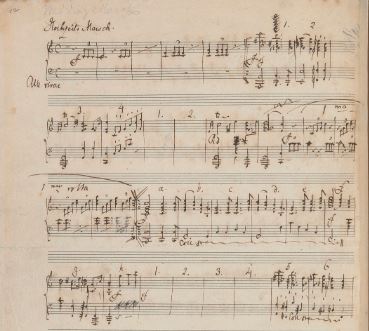Wedding March (Mendelssohn) on:
[Wikipedia]
[Google]
[Amazon]


Felix Mendelssohn
Jakob Ludwig Felix Mendelssohn Bartholdy (3 February 18094 November 1847), born and widely known as Felix Mendelssohn, was a German composer, pianist, organist and conductor of the early Romantic period. Mendelssohn's compositions include sy ...
's "Wedding March" in C major, written in 1842, is one of the best known of the pieces from his suite of incidental music (Op. 61) to Shakespeare's play ''A Midsummer Night's Dream
''A Midsummer Night's Dream'' is a comedy written by William Shakespeare 1595 or 1596. The play is set in Athens, and consists of several subplots that revolve around the marriage of Theseus and Hippolyta. One subplot involves a conflict amon ...
''. It is one of the most frequently used wedding march
Music is often played at wedding celebrations, including during the ceremony and at festivities before or after the event. The music can be performed live by instrumentalists or vocalists or may use pre-recorded songs, depending on the format o ...
es, generally being played on a church pipe organ
The pipe organ is a musical instrument that produces sound by driving pressurized air (called ''wind'') through the organ pipes selected from a keyboard. Because each pipe produces a single pitch, the pipes are provided in sets called ''ranks ...
.
At wedding
A wedding is a ceremony where two people are united in marriage. Wedding traditions and customs vary greatly between cultures, ethnic groups, religions, countries, and social classes. Most wedding ceremonies involve an exchange of marriage vo ...
s in many Western countries, this piece is commonly used as a recessional, though frequently stripped of its episodes in this context. It is frequently teamed with the "Bridal Chorus
The "Bridal Chorus" () from the 1850 opera
Opera is a form of theatre in which music is a fundamental component and dramatic roles are taken by singers. Such a "work" (the literal translation of the Italian word "opera") is typically a col ...
" from Richard Wagner
Wilhelm Richard Wagner ( ; ; 22 May 181313 February 1883) was a German composer, theatre director, polemicist, and conductor who is chiefly known for his operas (or, as some of his mature works were later known, "music dramas"). Unlike most op ...
's opera ''Lohengrin
Lohengrin () is a character in German Arthurian literature. The son of Parzival (Percival), he is a knight of the Holy Grail sent in a boat pulled by swans to rescue a maiden who can never ask his identity. His story, which first appears in Wolf ...
'', or with Jeremiah Clarke
Jeremiah Clarke (c. 1674 – 1 December 1707) was an English baroque composer and organist, best known for his ''Trumpet Voluntary,'' a popular piece often played at wedding ceremonies or commencement ceremonies.
Biography
The exact date of Cla ...
's "Prince of Denmark's March
The ''Prince of Denmark's March'' ( da, Prins Prince George of Denmark, Jørgens March), commonly called the ''Trumpet Voluntary'', was written around 1700 by the English composer Jeremiah Clarke, the first organist of the then newly-rebuilt St ...
", both of which are often played for the entry of the bride.
The first known instance of Mendelssohn's "Wedding March" being used at a wedding was when Dorothy Carew wed Tom Daniel at St Peter's Church, Tiverton, England, on 2 June 1847 when it was performed by organist Samuel Reay
Samuel Reay (17 March 1828 – 21 July 1905) was an organist and composer based in England.
Life
He was born on 17 March 1828, the son of George Agnew Reay, organist of Hexham Abbey, and Eleanor Spraggon.
His father moved to Ryton on Tyne and ...
. However, it did not become popular at weddings until it was selected by Victoria, The Princess Royal for her marriage to Prince Frederick William of Prussia on 25 January 1858. The bride was the daughter of Queen Victoria
Victoria (Alexandrina Victoria; 24 May 1819 – 22 January 1901) was Queen of the United Kingdom of Great Britain and Ireland from 20 June 1837 until Death and state funeral of Queen Victoria, her death in 1901. Her reign of 63 years and 21 ...
, who loved Mendelssohn's music and for whom Mendelssohn often played while on his visits to Britain.
An organ on which Mendelssohn gave recitals of the "Wedding March", among other works, is housed in St Ann's Church in Tottenham
Tottenham () is a town in North London, England, within the London Borough of Haringey. It is located in the ceremonial county of Greater London. Tottenham is centred north-northeast of Charing Cross, bordering Edmonton to the north, Waltham ...
.
Franz Liszt
Franz Liszt, in modern usage ''Liszt Ferenc'' . Liszt's Hungarian passport spelled his given name as "Ferencz". An orthographic reform of the Hungarian language in 1922 (which was 36 years after Liszt's death) changed the letter "cz" to simpl ...
wrote a virtuoso transcription
Transcription refers to the process of converting sounds (voice, music etc.) into letters or musical notes, or producing a copy of something in another medium, including:
Genetics
* Transcription (biology), the copying of DNA into RNA, the fir ...
of the "Wedding March and Dance of the Elves" (S. 410) in 1849–50. Based on Liszt's transcription, Vladimir Horowitz
Vladimir Samoylovich Horowitz; yi, וולאַדימיר סאַמוילאָוויטש האָראָוויץ, group=n (November 5, 1989)Schonberg, 1992 was a Russian-born American classical pianist. Considered one of the greatest pianists of all ...
then transcribed the "Wedding March" into a virtuoso showpiece for piano and played it as an encore at his concerts.
References
External links
* {{Authority control 1842 compositions 1842 in Germany Compositions by Felix Mendelssohn Compositions in C major Incidental music March music Wedding music